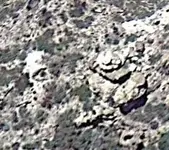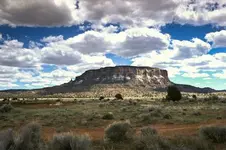Springfield wrote
Oro, you are frustrated that you can't convince the skeptics about the alleged magnitude of Jesuit mining and treasure caching in Arizona's Santa Cruz Valley, and the above argument is an example why.
The Planchas de Plata incident is a documented event in which a rich precious mineral deposit controlled by the Jesuits on the far northern Mexican frontier was seized by the Spanish, at the chagrin of the Jesuits. An open-minded observer would likely assume, as you speculated correctly IMO, that future 'bonanza-grade' deposits discovered by the Jesuits would also have been seized by the Spanish to exploit their obvious value.
From what we know, no such future seizures occurred. This is a telling fact, IMO. Considering the continued presence of Spanish explorers, settlers, mining entrepreneurs, and especially Spanish military in the region (Tubac presidio, especially), it seems obvious that the Jesuits discovered no more 'bonanzas', or else we would know about them. Your arguments to explain this problem center around the Jesuits somehow being able to keep these alleged bonanzas a 'secret', even from the nearby 'incompetent' soldiers at Tubac.
If you look into the Planchas de Plata, you find that the Yaqui Indian on finding the silver, instead of heading north to Guevavi to tell the padre, went south and told a Spanish trader. This act alone infuriated the Jesuits, whom had long instructed
the Indians that they must never reveal the location to anyone but their confessors (padres). Remember that statement from father Nentvig,
"No Indian will show a mine to a Spaniard, even if the Missionary pledges to fulfill promises made".
He was illustrating that rule was strong enough that even should the padres make pledges in support of the Spaniards,
the Indians would not tell - and this Yaqui simply went straight to the Spaniards and the rest is history. One might well suspect that Nentvig was setting the stage for any Spanish readers to forget about asking the local Indians where the mines are located, and to his Jesuit readers, a vote of confidence that "their" Indians would keep their collective mouths shut about "their" mines. The area where the Planchas de Plata was located was thought by the Jesuits to belong to their missions, even without any kind of legal document that gave title to the land.
I still do
not see the great quandary that you do, that there were Spanish soldiers at Tubac, and yet they were apparently either unaware of the mines in the nearby mountains, or
unconcerned about them. I see it that they were mainly un-concerned about them - they belonged to the MIssions, and being good Catholics, they should not raise issues about them. The Planchas de Plata was clearly NOT "claimed" by the Missions, the first word of it was to the Spaniards and NOT to the padres, so it would have been literally 'up for grabs' - it was not "seized" away from the Jesuits even though THEY seemed to see it that way, for the Jesuits had not had any kind of discovery claim on it.
To further illustrate this "collusion" of Spanish troops, there were Spanish soldiers assigned to the missions at various times, not a large force but could be as few as two men; surely these soldiers could see the activities at the missions including ore brought in and smelting, and yet they did not run to the Royal governor to report it. In fact the soldiers acted to HELP PROTECT the treasures of the missions, as in the case at Dolores, father Kino took the treasures of his church there and hid them in a cave, and none other than Captain Manje helped him do it. In fact we would not even know of this incident if not for Capt Manje whom wrote of it. Really the only people that the Jesuits had to worry about were Spanish civilians poking around, and these are the people that the Jesuits often complained about entering "their" mission areas, and made efforts to keep them OUT. By your line of reasoning, Captain Manje would have run straight to the Viceroy to report that the Jesuits had a treasure in Dolores, which would then be seized.
I would also point out that
Tubac was not even manned continuously; the residents there, even though required to remain there, even complained about being so exposed and finally got the authorities to assign some troops to the presidio. Not a regiment or battalion of troops, which would seem to be a minimal size force to protect the rather large area, but a single company, and understrength most of the time at that.
You seem to have "homed in" on the term "
incompetent" as a descriptive term of the Spanish soldiers. I thought I had tried to expound on that, rather than LOCK IT IN - based on their actual record, the Spanish soldiers were often brave enough, and had some FEW competent leaders like captain Anza, but
mostly were led by INCOMPETENT LEADERS, a couple of which refused to even venture out of the fort when ordered to 'punish' the hostile Indians. Even when the Spanish had "successful" expeditions against hostiles, as against the Seris in the mid 1760s, the reality was that they had hardly accomplished anything other than a drawn battle, in which yes, they managed to kill a few dozen Seri warriors and captured a few dozen more, yet they lost even more of their own Pima allies, which was sneeringly described as the Pimas having "deserved" this as "punishment". Read that list of lost settlements, mining camps and ranches in Rudo Ensayo, there are more LOST settlements than live ones, and most of these were NEVER regained by the Spanish. Does that sound like the Spanish military forces were highly capable of handling their Apache, and Seri and Yaqui enemies?
Word of the Jesuit mines DID filter down (south) to Spanish colonists too, and this is why there were expeditions of Spaniards to locate lost Jesuit mines in the early 1800s, when there were Franciscans manning the remaining missions in Arizona. It was not a COMPLETE SECRET, however there were very real dangers associated with looking for them, namely hostile Indians.
Springfield you seem to see many aspects of this in black and white, either the mines were a total secret like the Manhattan project or they would be widely published, either the mines were "bonanza" rich or they were practically worthless. It is nothing like that at all - some of the mines of Jesuit missions were so low grade that no Spaniard could work them at a profit, as was the case in Baja, others were quite rich, as at the Salero or Alta, which makes sense for the primitive methods available to the missionaries. If the mines were SO poor as you seem to imply,
there would not have been American miners re-opening them, much less the rather rich slag remaining, which must have come from quite rich ore.
My "frustration" comes from having carried this argument this far, utterly without result insofar as changing any minds. I had started out, and continued for most of it, just making the case to
anyone reading it, addressing the title questions of the thread, but some people have always attempted to make it into a personal 'contest' of one person talking to another, which is fine of course but this is a public forum, so my posts have not always been directed to one or two people rather to the CASE and questions of this thread. I don't <personally> care what YOUR opinions are, nor Cactusjumper, nor Igadbois nor Lamar (RIP) - we have MANY more readers following the discussion than are actively posting, whom are trying to judge the question based on what is posted. I don't know about the rest of us actively posting, but I have received quite a few emails and PMs from folks reading the discussion, whom have appreciated the information and enjoyed the debate, but these people do not post and probably will not.
The case for Jesuits having amassed treasures (not to mention properties, livestock) has been posted, and evidence that the Jesuits owned precious metal mines and operated them, which must produce precious metals and yet this bullion has never been accounted for, so really the "side" that I have been posting for has said plenty; over 150 pages so far and no sign that it will end. Had I known that some members would take it as a 'closed' group type debate, I would not have spent so much time nor posted so much. That kind of a debate can just as easily be done by emails or PMs, and instead of posting huge extracts we could have simply referred to the sources and let each other check when desired. I think we have shown that these "legends" of Jesuit mines and by extension, treasures, does NOT originate with treasure writers, which was one point I had hoped to dispel. As to just how rich the treasures or mines, that is largely in the mind of the reader, for what is to one person a "fortune" may be peanuts to another.
Good luck and good hunting Springfield, I hope you find the treasures that you seek, and ditto to anyone reading this post, which could have been in a PM, as could most of the one-to-one type debate.
Oroblanco





















